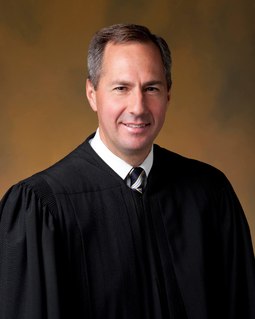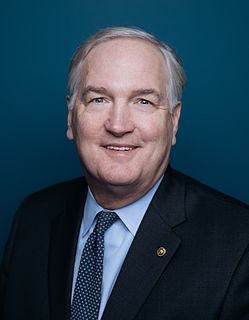A Quote by Orrin Hatch
Judges who take the law into their own hands, who make up constitutional 'rights' in order to strike down laws they oppose, undermine the people's right to have their values shape public policy and define the culture.
Related Quotes
If Americans loved judicial activism, liberals wouldn't be lying about what it is. Judicial activism means making up constitutional rights in order to strike down laws the justices don't like based on their personal preferences. It's not judicial activism to strike down laws because they violate the Constitution.
To be true to its constitutional role, the Supreme Court should refuse to be drawn into making public policy, and it should strike down legislation only when a clear constitutional violation exists. When judicial activists resort to various inventions and theories to impose their personal views on privacy and liberty, they jeopardize the legitimacy of the judiciary as an institution and undermine the role of the other branches of government.
In its proper meaning equality before the law means the right to participate in the making of the laws by which one is governed, a constitution which guarantees democratic rights to all sections of the population, the right to approach the court for protection or relief in the case of the violation of rights guaranteed in the constitution, and the right to take part in the administration of justice as judges, magistrates, attorneys-general, law advisers and similar positions.
But, that’s the whole point of corporatization - to try to remove the public from making decisions over their own fate, to limit the public arena, to control opinion, to make sure that the fundamental decisions that determine how the world is going to be run - which includes production, commerce, distribution, thought, social policy, foreign policy, everything - are not in the hands of the public, but rather in the hands of highly concentrated private power. In effect, tyranny unaccountable to the public.
In order to live, man must act; in order to act, he must make choices; in order to make choices, he must define a code of values; in order to define a code of values, he must know what he is and where he is – i.e. he must know his own nature (including his means of knowledge) and the nature of the universe in which he acts – i.e. he needs metaphysics, epistemology, ethics, which means: philosophy. He cannot escape from this need; his only alternative is whether the philosophy guiding him is to be chosen by his mind or by chance.
For better or worse, we are the Court of Appeals for the Hollywood Circuit. Millions of people toil in the shadow of the law we make, and much of their livelihood is made possible by the existence of intellectual property rights. But much of their livelihood - and much of the vibrancy of our culture - also depends on the existence of other intangible rights: The right to draw ideas from a rich and varied public domain, and the right to mock, for profit as well as fun, the cultural icons of our time.
There are people who oppose a federal Constitutional amendment because they think that the law of family should be made by the states. I can see a legitimate argument there. I think it's mistaken, however, because the federal government, through the decisions of life-tenured federal judges, has already taken over that area.
The public welfare demands that constitutional cases must be decided according to the terms of the Constitution itself, and not according to judges views of fairness, reasonableness, or justice. I have no fear of constitutional amendments properly adopted, but I do fear the rewriting of the Constitution by judges under the guise of interpretation.

































